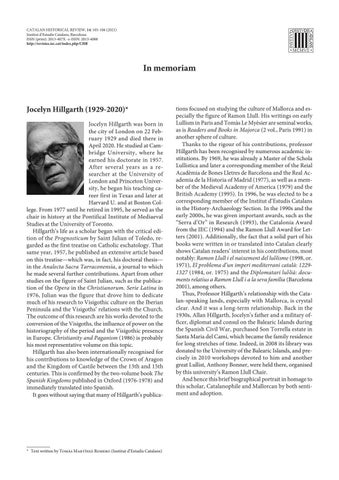CATALAN HISTORICAL REVIEW, 14: 105-106 (2021) Institut d’Estudis Catalans, Barcelona ISSN (print): 2013-407X · e-ISSN: 2013-4088 http://revistes.iec.cat/index.php/CHR
In memoriam
Jocelyn Hillgarth (1929-2020)* Jocelyn Hillgarth was born in the city of London on 22 February 1929 and died there in April 2020. He studied at Cambridge University, where he earned his doctorate in 1957. After several years as a researcher at the University of London and Princeton University, he began his teaching career first in Texas and later at Harvard U. and at Boston College. From 1977 until he retired in 1995, he served as the chair in history at the Pontifical Institute of Mediaeval Studies at the University of Toronto. Hillgarth’s life as a scholar began with the critical edition of the Prognosticum by Saint Julian of Toledo, regarded as the first treatise on Catholic eschatology. That same year, 1957, he published an extensive article based on this treatise—which was, in fact, his doctoral thesis— in the Analecta Sacra Tarraconensia, a journal to which he made several further contributions. Apart from other studies on the figure of Saint Julian, such as the publication of the Opera in the Christianorum. Serie Latina in 1976, Julian was the figure that drove him to dedicate much of his research to Visigothic culture on the Iberian Peninsula and the Visigoths’ relations with the Church. The outcome of this research are his works devoted to the conversion of the Visigoths, the influence of power on the historiography of the period and the Visigothic presence in Europe. Christianity and Paganism (1986) is probably his most representative volume on this topic. Hillgarth has also been internationally recognised for his contributions to knowledge of the Crown of Aragon and the Kingdom of Castile between the 13th and 15th centuries. This is confirmed by the two-volume book The Spanish Kingdoms published in Oxford (1976-1978) and immediately translated into Spanish. It goes without saying that many of Hillgarth’s publica-
tions focused on studying the culture of Mallorca and especially the figure of Ramon Llull. His writings on early Lullism in Paris and Tomàs Le Myèsier are seminal works, as is Readers and Books in Majorca (2 vol., Paris 1991) in another sphere of culture. Thanks to the rigour of his contributions, professor Hillgarth has been recognised by numerous academic institutions. By 1969, he was already a Master of the Schola Lullistica and later a corresponding member of the Reial Acadèmia de Bones Lletres de Barcelona and the Real Academia de la Historia of Madrid (1977), as well as a member of the Medieval Academy of America (1979) and the British Academy (1995). In 1996, he was elected to be a corresponding member of the Institut d’Estudis Catalans in the History-Archaeology Section. In the 1990s and the early 2000s, he was given important awards, such as the “Serra d’Or” in Research (1993), the Catalonia Award from the IEC (1994) and the Ramon Llull Award for Letters (2001). Additionally, the fact that a solid part of his books were written in or translated into Catalan clearly shows Catalan readers’ interest in his contributions, most notably: Ramon Llull i el naixement del lul·lisme (1998, or. 1971), El problema d’un imperi mediterrani català: 12291327 (1984, or. 1975) and the Diplomatari lul·lià: documents relatius a Ramon Llull i a la seva família (Barcelona 2001), among others. Thus, Professor Hillgarth’s relationship with the Catalan-speaking lands, especially with Mallorca, is crystal clear. And it was a long-term relationship. Back in the 1930s, Allan Hillgarth, Jocelyn’s father and a military officer, diplomat and consul on the Balearic Islands during the Spanish Civil War, purchased Son Torrella estate in Santa Maria del Camí, which became the family residence for long stretches of time. Indeed, in 2008 its library was donated to the University of the Balearic Islands, and precisely in 2010 workshops devoted to him and another great Lullist, Anthony Bonner, were held there, organised by this university’s Ramon Llull Chair. And hence this brief biographical portrait in homage to this scholar, Catalanophile and Mallorcan by both sentiment and adoption.
* Text written by Tomàs Martínez Romero (Institut d’Estudis Catalans)
Catalan Historical Review-14.indb 105
09/11/2021 15:11:55

